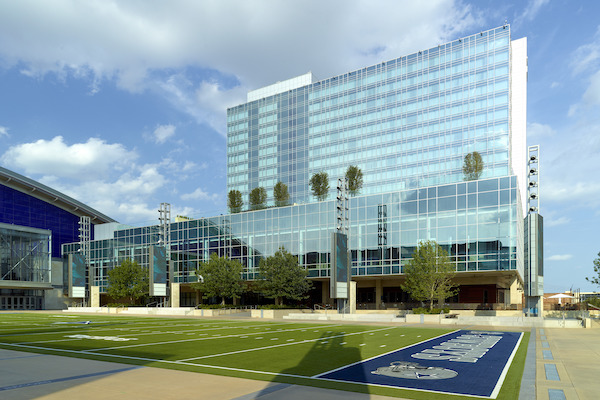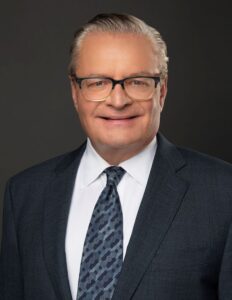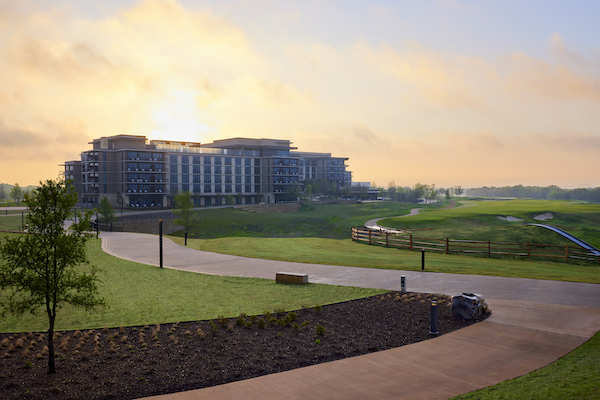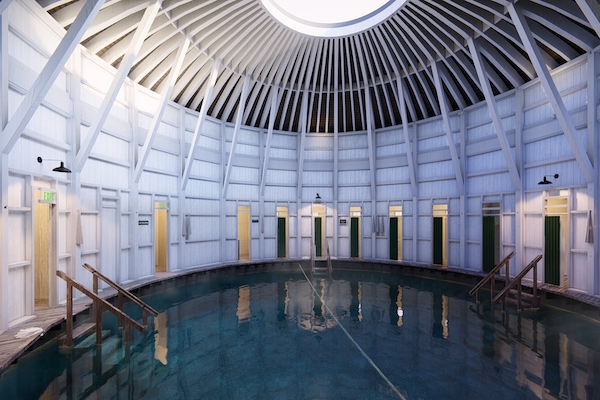The COVID-19 pandemic created a gulf for the hotel industry along the lines of property type and location. For instance, while many leisure-focused and drive-to-market properties thrived, urban, big-box, convention hotels foundered.
The chasm for Omni Hotels & Resorts, which is privately held by Dallas-based TRT Holdings, existed right within its 55-hotel portfolio, a mix of pure resorts, convention properties and urban locales, such as The Omni Homestead Resort in Hot Springs, Va., and Omni Dallas, to name two disparate property types. Omni’s portfolio mix itself combines around 40% resort, 40% convention and 20% city center.
Coming out of the pandemic, according to Peter Strebel, now the chairman of Omni Hotels & Resorts and former president, who has been with the company since 2009, all pistons are firing, igniting in 2022—”a banner year,” as Strebel called it, with revenue and EBITDA both exceeding 2019 levels.
Things have improved for Omni year after year on the earnings side, which is as much about luck as it is adroit and nimble decision-making. In 2020, Omni made $40 million in EBITDA. “Most companies lost money,” Strebel said, attributing the positive result to the decision to keep resorts open during the summer. In 2021, EBITDA improved dramatically to $360 million before climbing to $650 million last year. This year, Strebel said, Omni will be at around $720 million in EBITDA. “We’re growing at a double-digit pace,” he said, adding that within its portfolio, Omni Grove Park Inn, in Asheville, N.C., is the company’s most profitable asset.
A hotel company like Omni fares well when all segments of the industry are humming along, but it thrives when group and association business brim. For Omni, corporate transient arrived first, with subsequent gains in both group and association business, which heavily drives convention hotel business. Strebel said group business began coming back in late 2021 and “blew it away in 2022.”
The pandemic put meetings into hibernation mode, but they are roaring back after a lengthy slumber. “The number-one reason for people having meetings is because they’ve been away from each other for two years, companies are hiring a lot of people and no one knows anybody, so you bring them together, you bring in training and you boost morale and establish culture,” Strebel said. The week HOTELS spoke to Strebel, in June, he said that the recently opened Omni PGA Frisco Resort, in Texas, which will host the 2027 PGA Championship, had a total buyout by a company for three days. In July, the property had back-to-back buyouts from pharmaceutical companies.
“Group business is hot; it’s what everyone is talking about,” Strebel said.

Aside from filling rooms, group and convention business are a boon for ancillary spend, from food and beverage to other on-property and revenue-generating services. The rates groups typically pay are cheaper than transient guests, but the auxiliary benefits are not insubstantial.
Corporations are spending money on food and beverage, Strebel said, but if they are tightening the belt, it’s potentially trading down to chicken from steak for dinner, for instance. “We are seeing catering and banquet spend at the highest we’ve ever seen it,” Strebel said. “That says to me that the economy’s good.”

It’s certainly a similar pattern at resorts, which are not unlike casinos: get the people through the doors and watch them spend. Occupancy, of course, matters, but in the resort space, total revenue and total spend per customer is what really counts. “Nothing’s worse than an empty resort,” said Strebel. “But you have to realize that whatever your rate is, they’re going to probably spend two times that in spa or golf.” Strebel said Omni is setting records in both spa and golf revenue.
Omni, like other resort companies, avoids lowering rates; rather, it induces customers through myriad packages, which, for instance, could be 10% off the third night. “It’s more about incentives,” Strebel said.
Everything has come together into what Strebel called a “new normal,” one that all companies need to adapt to, as Omni has tried. Consider Omni’s New York hotel, Omni Berkshire Place, between Madison and Fifth Avenue, close to Cartier and Rockefeller Center and right next to BlackRock, the largest asset manager in the world. “It’s an ideal location,” Strebel said, but during the pandemic, it was shut down. There was even talk to never open again.
“We sell out basically midweek and then leisure some weekends,” Strebel said of the property. “It’s 400 rooms, one restaurant and call it a day.” Omni kept it shut for a year and due in part to impacts from union-related issues, there was real discussion to not reopen, Strebel said. “We were like, ‘If we reopen the way they want us to and we’re gonna lose more money and we don’t have a mortgage on it, why don’t we just keep it shut?'” (The hotel reopened on November 1, 2021.)

STRUCTURED APPROACH
Unlike many branded hotel companies, which either franchise or operate hotels, eschewing ownership, Omni continues to operate and own assets through its parent company, TRT, or through joint ventures. All but 11 hotels are 100% owned and operated by Omni; others, such as Omni San Diego and Omni Frisco at The Star, are 50% owned by Trinity Investments and the Dallas Cowboys, respectively.
The Star is the 91-acre campus of the Dallas Cowboys World Headquarters and practice facility in Frisco, Texas, developed in partnership between the City of Frisco and Frisco ISD. It’s an immersive experience for Cowboys fans, with the Omni hotel, there, an anchor.
It was the brainchild of Cowboys owner Jerry Jones, of whom Strebel called a “great guy” and sang the praises of the entire Jones family.
Omni, in fact, is drawn to projects connected to sports and professional teams. Beyond The Star, Omni also operates and is half owner of the Omni Hotel at The Battery Atlanta. The other owner: the Atlanta Braves, which play their home games next door at Truist Park.
Meanwhile, Omni is also tending to the upkeep of its portfolio. One of its latest projects is the $160-million meticulous renovation of The Omni Homestead, a storied resort property in Virginia, which, by many accounts, is the oldest resort in the U.S., dating back to 1766. It’s hosted 23 U.S. presidents. Completion of the renovation should be done by fall and includes an entire redo of the famed hot springs pools.
“I hate when people take these old hotels and kind of modernize them,” Strebel said. “We brought it back to its original look.” Omni worked with Wimberly Interiors and Richmond architecture firm 3North, which used the 2016 Historic Structures Report as a guide to preserve the Homestead’s hot spring pools and bathhouses. Strebel said the restoration was a “piece of wood by piece of wood” operation and every piece had to be inspected by the Virginia Historical Society to decide if it had to be reused, refinished or replaced.
“When you walk in the lobby today, you’re going to look at it and think you just stepped back into 1766, because everything is redone and authentic to what it was,” Strebel said.

COMING SOON
New development has become more difficult in the current interest rate climate, but Omni has two new-construction projects on the horizon. One is the Omni Fort Lauderdale, connected to the Broward County Convention Center. The 800-room hotel is slated to break ground soon with a scheduled opening date of 2026. Omni is also on the cusp of getting started on its first hotel in Mexico, which would be only its third hotel outside the U.S. (it has two in Canada). Strebel, excitingly, said Omni was “hopefully” set to begin construction on a property in Punta Mita, already home to a slew of luxury hotels.
Omni is currently marked as an upper-upscale brand by STR, with ADRs that are typically over $300 per night throughout the portfolio. The idea of adding another brand is not lost on Strebel, but while many higher-end brands look to launch brands down the chain scale, Strebel has another idea. “We’ve elevated our brand over the last 13 years to be bordering on luxury,” he said. “I don’t want to do a light model.”

Instead, Strebel said there is room potentially for a brand above where Omni currently sits, a product that could be a “hotel within a hotel.” Taking, for example, a section of a current hotel (many Omni properties include villa accommodations) and elevating it. “We’re thinking about that,” Strebel said.
Strebel certainly has elevated Omni during his time with the company. In 2022, he gave up the presidency to become chairman, with his duties assumed by current president Kurt Alexander, himself 10 years with the company. There is a sea of change awash at Omni, an injection of what one could call younger blood. Contemporaneously, at parent company TRT, founder Robert Rowling formerly turned over the business to his son, Blake. The moves also coincided with the June unveiling of new creative behind the Omni brand, including a new logo. (The previous logo dated back to the 1980s.)
Of the Rowlings, Strebel said they were meant to be in the hospitality business. “They’re really into the business,” Strebel said. “Just nice people.”
And it’s not as if Strebel is going anywhere soon. “I’m still having fun,” he said.
